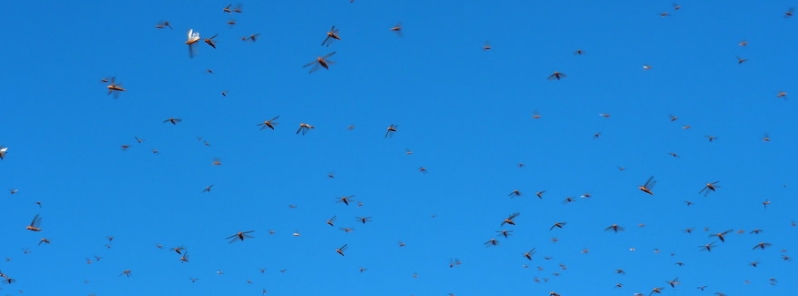Immature locust swarms decline but still persisting in Kenya and Ethiopia

Immature swarms continue to decline in Kenya and Ethiopia due to the ongoing control operations, according to an update by the UN Food and Agriculture Organization (FAO) on Tuesday, March 16, 2021. However, swarms are persisting in the absence of rainfall. International experts on migratory pests urged the affected countries to deploy drones to boost the fight against the pests.
In Kenya, small immature swarms were seen between Mt. Kenya and the Rift Valley in Nyandarua, Nakuru, and Baringo counties in the past few days. In Ethiopia, immature swarms persist in the Ahmar Mountains east of the Rift Valley but appear to be declining in southern SNNP.
There is cautious optimism of signs that the current upsurge is winding down in the Horn of Africa, especially if poor rains limit breeding this spring, followed by equally poor rains during the summer in northeast Ethiopia," said FAO.
"However, it will be essential to sustain current survey and control operations in Ethiopia, Kenya, and Somalia, and maintain vigilance in case there is any unusual rainfall."
For the second year in a row Ethiopia is facing large scale #desertlocust swarms
These locusts know no borders, so the and @FAOemergencies are leading the locust response for East Africa, using data and surveillance to protect food security in the region. pic.twitter.com/Z1kd3G3sgb
— UK in Ethiopia (@UKinEthiopia) March 15, 2021
The governt of kenya ,,bring those spray drones to Baringo we have been invaded by millions of locust!! pic.twitter.com/6ciVNkjqaN
— Bartarop (@bartarop) March 17, 2021
As of present, swarms continue to decline due to ongoing control operations. However, showers may occur by the end of March in some areas, which could trigger breeding.
Stephen Njoka, director of the Desert Locust Control Organization for Eastern Africa, advised the use of drone technology to combat the insects.
"The deployment of drones is a key breakthrough in surveillance of the locusts, even though they are yet to be useful in spraying due to their limited load capacity," he stated in a virtual briefing in Nairobi.
Daniel Willy, program officer with African Agricultural Technology Foundation (AATF), called for a regional coordinated approach for the emergency registration of pesticides.
Featured image credit: Flickr

Commenting rules and guidelines
We value the thoughts and opinions of our readers and welcome healthy discussions on our website. In order to maintain a respectful and positive community, we ask that all commenters follow these rules:
We reserve the right to remove any comments that violate these rules. By commenting on our website, you agree to abide by these guidelines. Thank you for helping to create a positive and welcoming environment for all.